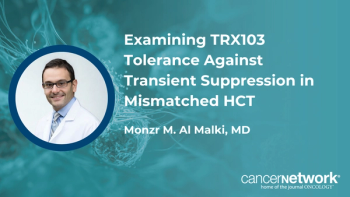
Data Support Shorter Radiation Course in Breast Cancer With Reconstruction
Those with breast cancer who have undergone implant-based reconstruction following mastectomy have similar outcomes with hypofractionated vs conventionally fractionated radiotherapy.
Findings from the phase 3 FABREC study, assessing hypofractionated vs conventionally fractionated radiotherapy in patients who have undergone mastectomy and implant-based reconstruction, highlighted “equivalence” between study arms in terms of outcomes and safety, according to Julia S. Wong, MD.
In an interview with CancerNetwork® during the
In a population of 385 patients, investigators reported no difference in several oncologic outcomes between treatment arms, including distant recurrence, local recurrence, and death. Additionally, there were no differences in toxicity between hypofractionated radiotherapy and conventionally fractionated radiotherapy, including chest wall toxicity (P = .80).
Transcript:
We looked at quality of life outcomes and the change in physical wellbeing at 6 months; that was our primary end point. The outcomes with respect to cancer were equivalent between the 2 groups with no evidence that there was a detriment in cancer outcomes with the shorter course.
As we know, not all patients who have mastectomies require radiation. Those who do often undergo reconstruction. This is the first study looking at shorter radiation vs longer radiation in a randomized way, which we know is established in the breast conservation setting. While there are randomized data on post-mastectomy radiation schedules in patients who don't have reconstruction, this is the first randomized trial of patients who have had reconstruction.
I would say that the patients in this study all had implant-based reconstruction. Patients who might have reconstruction using their own tissue were not [included] in this trial; we don't have information on what those outcomes would look like. That’s a question for another study. Perhaps, for patients who might have different risk diseases who weren’t part of the study population, we would want to be careful that the patients who receive radiation, receive radiation as would have been recommended by their radiation oncologist for their situation.
Reference
Wong JS, Uno H, Pellegrini C, et al. Patient-reported and toxicity results from the FABREC study: a multicenter randomized trial of hypofractionated vs. conventionally-fractionated postmastectomy radiation therapy after implant-based reconstruction. Presented at 2023 American Society for Therapeutic Radiology and Oncology (ASTRO) Annual Meeting; October 1-4, 2023; San Diego, CA. Abstract LBA05.
Newsletter
Stay up to date on recent advances in the multidisciplinary approach to cancer.










































